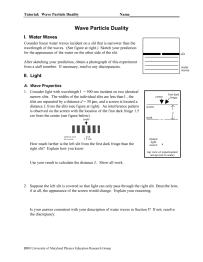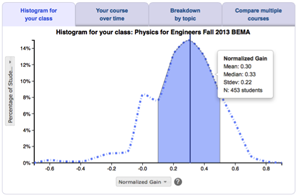
Developed by: Michael Wittman, Richard Steinberg, and Edward Redish






middle schoolhigh schoolintro collegeinter-mediateupper levelgrad school other

calc based

alg based

conceptual






Overview
What? Resources for teaching introductory quantum mechanics and modern physics with an emphasis on concepts and applications. Includes tutorials, suggested software, homework, exam questions, and information on understanding how students learn the physics.
Topic outline
Introduction to QM: The Experimental Base
- The photoelectric effect
- Electron diffraction
- Atomic spectra
Building the Quantum Model
- The Thomson and Rutherford models
- The Bohr model
- deBroglie waves
Wave Mechanics
- Electron dispersion relation
- The 1D Schrödinger equation
- Group and phase velocities
- Fourier transforms
- The uncertainty principle
Bound States
- Potential energy diagrams
- Infinite square well (1, 2, and 3D)
- Finite square well
- Harmonic oscillator
- Delta function
Scattering State
- Scattering at a step
- Delta function
- Barrier penetration and tunneling
Spin and Statistics
- Introduction to spin (no math)
- Fermi and Bose statistics
Quantum Models of Matter
- Double well - molecular bonding
- Multiple wells - band structures
Conductivity
- Conductors, semiconductors, insulators
- Quantum polarization (applying an external electric field)
Devices
- pn-junctions / diodes
- transistors
- MOSFETs
- SQUIDs
Student skills developed
- Conceptual understanding
- Making real-world connections
Instructor effort required
- Medium
Resources
Teaching Materials
You can download the tutorials, pre-tests, homework, essay questions, exam questions, software, and other handouts for free from the New Model Course curriculum page on PhysPort.
These tutorials were originally published as a book by Wiley as the Activity-Based Tutorials Volume 2, but it is now out of print.
Research
This is the second highest level of research validation, corresponding to:
- at least 1 of the "based on" categories
- at least 2 of the "demonstrated to improve" categories
- at least 4 of the "studied using" categories
Research Validation Summary
Based on Research Into:
- theories of how students learn
- student ideas about specific topics
Demonstrated to Improve:
- conceptual understanding
- problem-solving skills
- lab skills
- beliefs and attitudes
- attendance
- retention of students
- success of underrepresented groups
- performance in subsequent classes
Studied using:
- cycle of research and redevelopment
- student interviews
- classroom observations
- analysis of written work
- research at multiple institutions
- research by multiple groups
- peer-reviewed publication
References
- L. Bao and E. Redish, Understanding probabilistic interpretations of physical systems: A prerequisite to learning quantum physics, Am. J. Phys. 70 (3), 210 (2002).
- C. De Leone and G. Oberem, Toward Understanding Student Conceptions of the Photoelectric Effect, presented at the Physics Education Research Conference 2003, Madison, WI, 2003.
- S. McKagan, W. Handley, K. Perkins, and C. Wieman, A Research-based Curriculum for Teaching the Photoelectric Effect, Am. J. Phys. 77 (1), 87 (2009).
- J. Morgan and M. Wittmann, Examining the Evolution of Student Ideas About Quantum Tunneling, presented at the Physics Education Research Conference 2005, Salt Lake City, Utah, 2005.
- J. Morgan, M. Wittmann, and J. Thompson, Student Understanding of Tunneling in Quantum Mechanics: Examining Interview and Survey Results for Clues to Student Reasoning, presented at the Physics Education Research Conference 2003, Madison, WI, 2003.
- R. Scherr and M. Wittmann, The challenge of listening: The effect of researcher agenda on data collection and interpretation, presented at the Physics Education Research Conference 2002, Boise, Idaho, 2002.
- R. Steinberg and G. Oberem, Research-based instructional software in modern physics, J. Comput. Math. Sci. Teaching 19 (2), 115 (2000).
- R. Steinberg, G. Oberem, and L. McDermott, Development of a computer-based tutorial on the photoelectric effect, Am. J. Phys. 64 (11), 1370 (1996).
- R. Steinberg, M. Wittmann, L. Bao, and E. Redish, The Influence of Student Understanding of Classical Physics When Learning Quantum Mechanics, presented at the National Association for Research in Science Teaching, Boston, MA, 1999.
- M. Wittmann and J. Morgan, Understanding Data Analysis from Multiple Viewpoints: An Example from Quantum Tunneling, presented at the Physics Education Research Conference 2003, Madison, WI, 2003.
- M. Wittmann, J. Morgan, and L. Bao, Addressing Student Models of Energy Loss in Quantum Tunneling, Eur. J. Phys. 26 (6), 939 (2005).
- M. Wittmann and R. Scherr, Student Epistemological Mode Constraining Researcher Access to Student Thinking: An Example from an Interview on Charge Flow, presented at the Physics Education Research Conference 2002, Boise, Idaho, 2002.
- M. Wittmann, R. Steinberg, and E. Redish, Investigating student understanding of quantum physics: Spontaneous models of conductivity, Am. J. Phys. 70 (3), 218 (2002).





